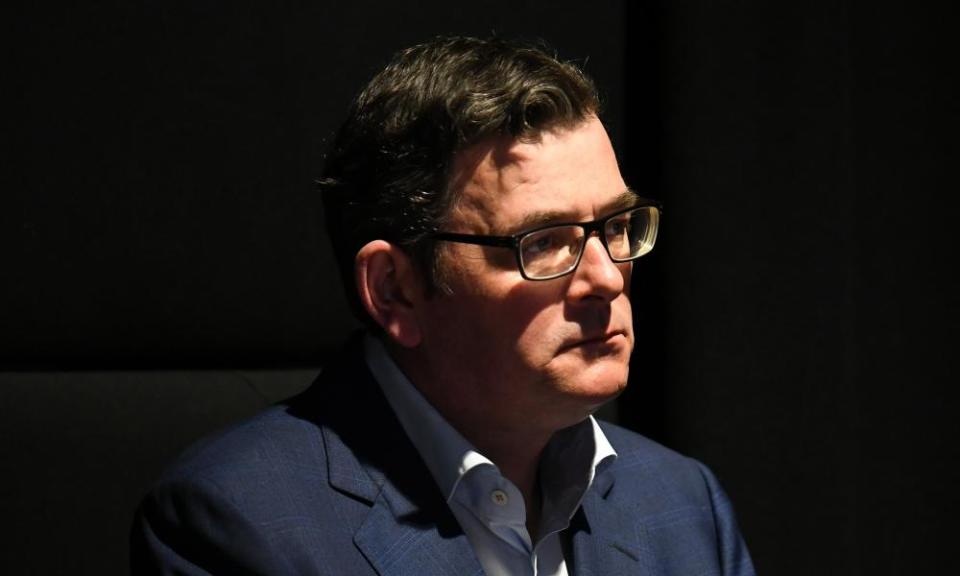Victoria hotel quarantine failures 'responsible' for Covid second wave and 768 deaths, inquiry told

The failures in Victoria’s “hastily assembled” hotel quarantine are “responsible” for the state’s 768 deaths and 18,418 cases since the end of May, the inquiry heard on Monday.
After 25 hearings and 63 witnesses over the course of the past two months, the inquiry heard closing submissions from the counsel assisting the inquiry, with the state’s second wave squarely blamed on the hotel quarantine program.
“One only needs to pause and to reflect on those figures to appreciate the full scope of devastation and despair occasioned as a result of the outbreak,” counsel assisting Ben Ihle said.
“It was a program which failed to meet its primary objective to keep us safe from the virus.”
The second wave can be traced back to Covid-19 outbreaks transmitted from returned travellers to staff, including security guards, at two quarantine hotels – the Stamford Plaza and the Rydges on Swanston. The inquiry heard the outbreak likely originated at the Rydges via environmental transmission due to poor infection-control practices at the hotel.
Throughout the course of the inquiry, none of the witnesses, including the premier, Daniel Andrews, said they made the decision to use private security guards for guarding returned travellers.
Rachel Ellyard, counsel assisting, said that throughout the course of several meetings on 27 March, senior public servants in Victoria, including the emergency management commissioner, Andrew Crisp, and the state’s then-police commissioner, Graham Ashton, made a “creeping assumption” that private security would be used to guard hotels, not police.
“There wasn’t any specific decision,” Ellyard said. “It wasn’t a specific decision by an individual or by a group. It was a creeping assumption that became the reality.”
Ellyard said that because there was no decision, there was no consideration of whether it was appropriate or not, so it was a failure in decision-making.
She said that although Victoria police strongly denies its preference influencing the decision, the “consensus was influenced and strongly influenced … by everyone at that meeting understanding what Victoria police’s preference was”.
“Their preference became the outcome.”
Related: Victoria Covid hotspots: list of Melbourne and regional case locations
Absent of oversight from someone with infection control expertise and training, Ellyard said, the use of private security firms was not appropriate for hotel quarantine.
Ellyard said the use of Australian Defence Forces officers in hotel quarantine would have been cheaper than private security for Victoria and more effective due to their command and control structures and not being in insecure work, which added to the spread due to guards working other casual jobs while infectious.
However, the inquiry was not invited to find that ADF should have been engaged, but could find the premier should have been made aware by the head of his department, Chris Eccles, that ADF was on offer.
There was also criticism of the decision by the Department of Jobs, Precincts and Regions (DJPR) to use Unified Security, a company that was not on the state government’s panel of preferred suppliers.
The department gave the company the bulk of the contracts, which then subcontracted out to another firm with just two directors who employed hundreds of guards across six hotels.
The companies themselves could not shoulder all the blame, with the inquiry hearing security guards were being asked to do more than expected of them, and that contracts should not have put responsibility for personal protective equipment and infection control on the security firms.
The counsel assisting said the contracts should have resided with the Department of Health and Human Services, not DJPR, and that the chief health officer, Prof Brett Sutton, or someone with similar health expertise should have been put in charge of the program.
The inquiry heard declaring the Rydges as a “hot hotel” for Covid-positive travellers “appears to have made sense as a sound public health measure” but needed attention on infection control.
Related: Victoria and Melbourne Covid trend map: where coronavirus cases are rising or falling
Infection prevention and control measures across not only the two outbreak hotels but the entire program were inadequate, Ihle said.
“The program did not match the expectation of what a proper quarantine program should look like, where the role of the whole program is infection control,” he said.
Health department secretary Kym Peake, jobs department secretary Simon Phemister and premier’s department secretary Chris Eccles were also singled out for not informing their ministers about the operation of the program.
“They likely contributed to a loss in opportunities to identify issues, which may have prompted better follow up and more timely action,” counsel assisting Tony Neal said.
The health minister, Jenny Mikakos, resigned from her position and from parliament on Saturday after Andrews’ evidence stated he believed she was responsible for the program, and should have known about the use of private security firms from 8 April. Mikakos has denied she was aware of private security guards being used prior to the Rydges outbreak.
Those who appeared before the inquiry have seven days to respond to the submissions made by counsel assisting, and say why the inquiry should not make such findings.
The head of the inquiry, Jennifer Coate, will provide her report to government on 6 November.

